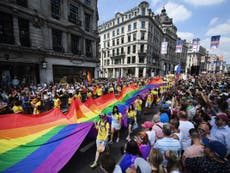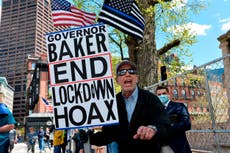Police have no place at future Pride marches. Queer people of colour want to feel safe
Allowing the police to be there in uniform ignores the safety of our black and non-black queer friends and family who want to celebrate their identities in a happy and open space

The police do not belong at Pride. It’s a controversial statement, and I know many will disagree with me, as there are many police officers who are also part of the LGBT+ community. I wholeheartedly support their right to exist and their identities as an LGBT+ person, but they should not be marching at Pride in police uniforms.
And while Pride marches may be cancelled due to the pandemic, this seems like a good time to explore this issue further.
Pride is a celebration, a chance for the queer community to come together and express our love for each other, and honour those who came before us and fought for the freedoms that we currently enjoy. However, Pride is also a protest and has always been a protest, commemorating those who fought against violent police officers for queer liberation at the Stonewall Inn in 1969.
And while Pride marches may be cancelled across the country due to the pandemic, this seems like a good time to explore this issue further.
While it is now illegal to discriminate based on gender identity or sexuality, and marriage between same-sex couples is allowed, the fight is not over. Across the world, LGBT+ people are persecuted by their governments. In some cases they are stoned or sentenced to death, are not able to legally get married and do not have discrimination laws to protect them. We think of Britain as a pinnacle of democracy and freedom, and while LGBT+ are not persecuted by state-sanctioned violence as in Iraq, Uganda, Russia, Egypt and many other countries where homosexuality is still a crime, there is still a long way to go before LGBT+ people are treated with the respect and dignity that heterosexual people are.
Just last year, parents protested outside a primary school in Birmingham in order to prevent LGBT+ relationships being taught to children in schools. The protests were just over 30 years after the introduction of the Section 28 clause, which “banned the promotion of homosexuality by local authorities and in Britain’s schools,” by former prime minister Margaret Thatcher. Despite the law preventing discrimination based on sexuality or gender identity, it still happens, and almost every week there are transphobic articles appearing in the UK’s biggest newspapers. The point is, LGBT+ people have more to fight for, and Pride is a part of that fight, just as the current Black Lives Matter protests are about the fight against brutality and institutional racism by the police.
Having the police at Pride, marching alongside us all, is not a show of solidarity for me. It is an insult to the black and non-black people of colour within the LGBT+ community that are so often forgotten about, ignored, and subject to racial abuse by the white people in the queer community – a prime example being when Manchester Pride wanted to introduce an inclusive Pride flag with black and brown stripes and was faced with vitriol and asking whether they would add “a white stripe” to represent white people.
The queer community has a lot to do in terms of being inclusive of people of colour and making them feel comfortable at Pride. Allowing the police to be there in uniform, even in a non-policing capacity, ignores the safety of our black and non-black queer friends and family who want to celebrate their identities in a happy and open space.
A fear of police is not an irrational fear to have among people of colour, because there are real and often deadly consequences to interacting with the police – George Floyd, Breonna Taylor, Philando Castile, Anthony Grainger, James Ashley and countless others are proof of that. Seeing the police there keeps us on-edge, and makes us feel like we are the trespassers into a community that should belong to us. The queer community as a whole needs to be mindful of the presence of the police, however benign, may affect us every time we attend Pride.
Individual LGBT+ police officers may be proud of their career, of making it to that point despite long standing allegations of homophobia and discrimination within the police itself, but overcoming this institutional bias should not be celebrated. Having a number of LGBT+ officers does not mean that homophobia has been eradicated – it is the queer equivalent of saying “I’m not racist because I have a black friend”.
This year, due to the Covid-19 pandemic, Pride has been cancelled across the UK and the queer community will not be able to celebrate or protest the way we have in the past. But, when we emerge out of lockdown and are able to attend Pride parades again in the future, I don’t want to see the police at Pride anymore.





Join our commenting forum
Join thought-provoking conversations, follow other Independent readers and see their replies